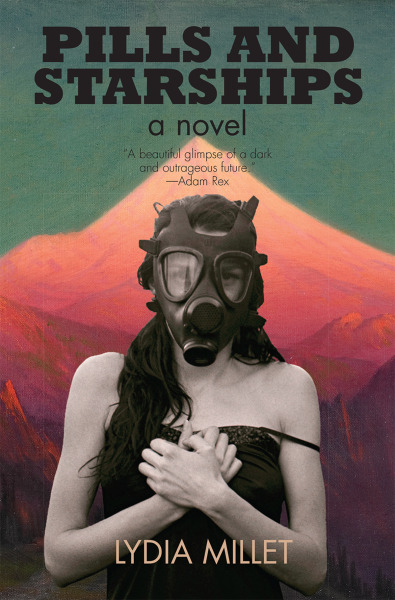I am not typically a fan of dystopian-YA literature. The genre is usually so formulaic: heroine discovers flaws in supposedly perfect futuristic government, falls in love with random rebel guy on the way, goes forward to take down the bad guys---and always, always, ALWAYS in a trilogy. OH. MY. GOD. The freaking trilogies. And why do these keep coming out? Because that's where money is. It's like those cheesy rap songs that endlessly describe supposedly fun clubs where most people end the night by throwing up. Sounds great! They only succeed because of the overflow of demand from, well, Young Adults.
Now, Pills and Starships definitely fits into the dystopia/utopia YA genre. It's about a young girl in a futuristic society dealing with the extreme pollution left behind by people nowadays. They live on different pills, or "pharma"--such as mood pharma or vision pharma. These extend life so much that elderly people, who had their children in their 60's, leave this world by buying death contracts. As Nat (the main character) and Sam (her brother) go through their parents' last days, they discover a different land than the one that they're told is the only place they'll survive.
Dystopian? Check. Futuristic Government? Check. Random Rebel Guy? Check. However, before you run away, this book is really good. The author, Lydia Millet did really well breaking away from the typical YA genre. It's really hard to steer clear of, and, although it is a DYA (I'm sick of writing out Dystopian Young Adult), it's a well written one.
The first thing I loved about this book is that the future was a result of the past. (y'all: um....yeah?---me:I'll explain! Calm down.) In most DYA's, you are introduced to a new society/government, but the author doesn't really explain how we go there. (Either that or there was some GREAT WAR (ominous voice) and society went overkill on making sure that it didn't happen again.) This strategy seems kind of lazy. But Lydia Millet doesn't do that at all. She really delves into the history of the earth as the characters know it. It's a lot harder to do than just have some random war. Here's an excerpt.
Sometimes a visionpharm helps me work on my collection. I don't need it, but I can definitely use it to good effect. Once or twice I've found things whose loveliness I wouldn't have seen without the pills I was on. But, see, that loveliness is real, because later, after the pills wear off, I can still see it in the collected thing.
For instance, this one day I took a visionpharm because I was sad--a facefriend had caught a bug called Marburg and she died. I'd really liked her, we'd been gaming for over a year and vidconfing for just the last month or two; she had freckles and a sweet smile. I didn't want moodpharm , for some reason, I wanted visionpharm instead.
And after I took it I was wandering in the complex thinking of her and I found a plain rock. Somehow the rock became lovely to me, like I could see pieces of stars in it, pieces of primordial matter. In that plain rock I can still see the beginning of everything.
Even when I was flat again, I still loved that rock.
Mostly what Sam objects to is the controlling attitude that pharma has, their ads and slogans that make it seem like if you're not on mood-management pills 24-7 then you're callously "playing mood roulette." They try to make it seem like you're an irresponsible person if you're not a max-dose regular. Selfish and flaky--even a little bit insane.
It used to be they just hard-sold the pharma to grown-ups, but now they figure they have to capture the youth population too. We're getting older and sooner or later, they figure, we're going to get hella depressed.
So they're already grooming us to have an eventual death wish. I mean it's obvious, we're not stupid. And in a way, I guess it's creepy, yes, as Sam had said to me more than once. But then it's also nature. Is it more creepy or more natural? I can't decide. I mean, it's always been natural to die. And wise to accept death since it's the biggest fact of life. Blah blah.
And yet.
Sam says he has nothing against death, in and of itself. What he doesn't like is management, which he refers to as "pharmacontrol." He and his hackerfriends on face like to get mad and they have their own lexicon of angry words.
Among the hackerkids there are a bunch of different factions; some say they don't believe in pharms at all--though most of their parents make them stay on their daily doses anyway, of course--while other ones only believe in fastpharms because they don't think being sped up is bad. They think it helps their rebel cause.
Some of them wear their hair in old-time punk styles to show us all what big rebels they are. That always makes me laugh--the mohawks and silly drawings shaved into the stubble and all that--but not in front of Sam.
"He's fourteen," is what my mother's said to me about Sam and hacking. She smiles and sighs.
It was so interesting to see Nat become a rebel in about the last third of the book. You could see her changing. In most DYA's, everyone is a rebel right off the bat. But you can see that Nat is pretty happy with the system--she even mocks her rebel brother. But I absolutely adore that Lydia Millet really constructed Nat as the book journeyed on. That's something that I rarely see.
Look for this rare gem of a book when it comes out in June 2014! Published by Akashic Books.

No comments:
Post a Comment